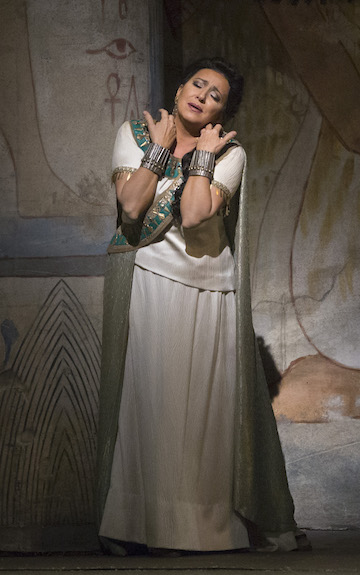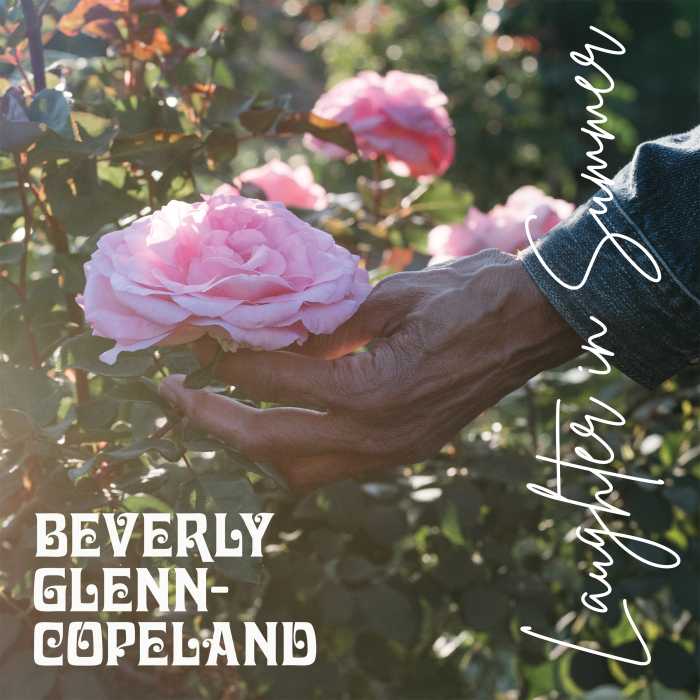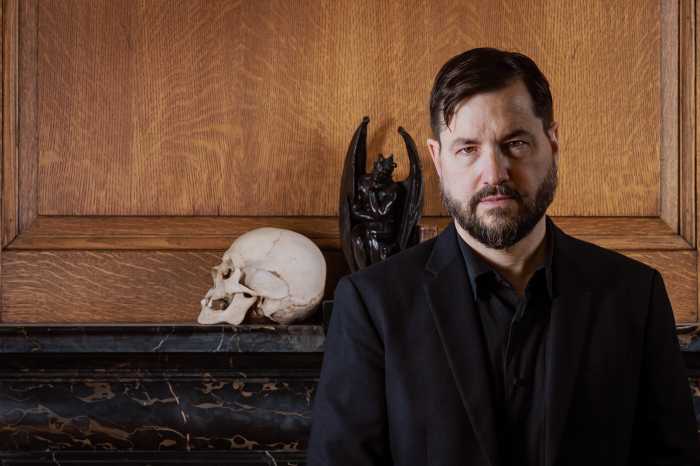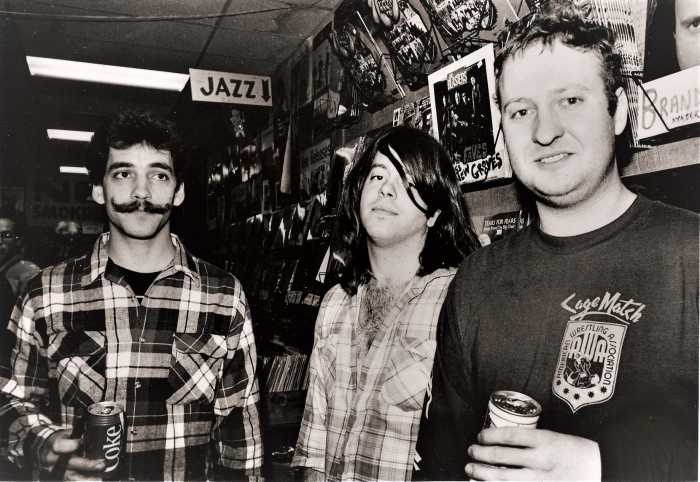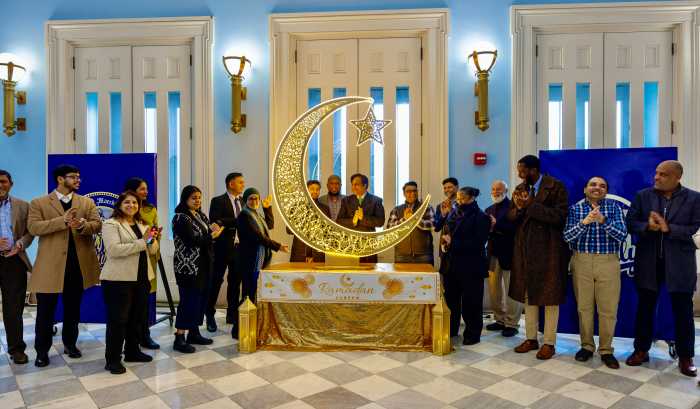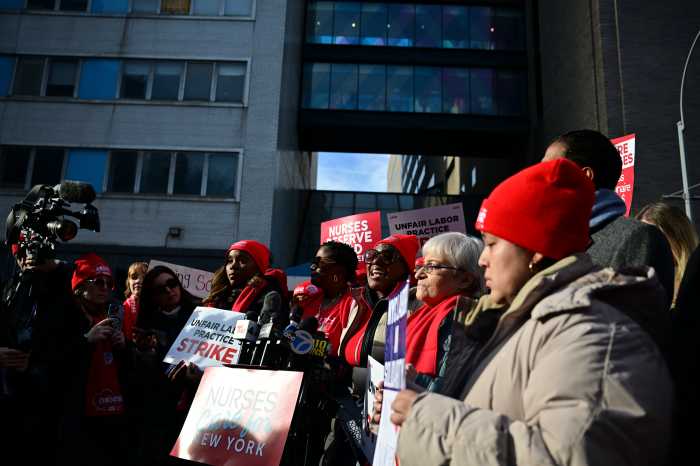ReneÌe Fleming and EliÌ„na GarancÌŒa in Robert Carsen’s staging of “Rosenkavalier” at the Metropolitan Opera. | KEN HOWARD/ METROPOLITAN OPERA
The Met finally replaced its beloved if stodgy 1969 staging of “Rosenkavalier” with Robert Carsen’s clever, usually over-busy production from Covent Garden, sporting striking if not always handsome Sezession sets (Paul Steinberg) and outstanding pre-World War I period costumes (Brigitte Reiffenstuel). Strauss and von Hofmannsthal crafted three stupendous act endings; to me, Carsen finessed only the first, with the Marschallin exiting through doors seemingly closing down possibilities. Act II’s group photograph and the “surprise” military massacre at the very end both draw on currently egregiously overworked clichés. Some ideas and images were brilliant, but then Carsen would have furniture moved or multiple couples dancing pointlessly at key musical moments.
Opening night occasioned boos for the production team but no one booed April 17’s second night. Instead, there were cheers for the strong musical performance under Sebastian Weigle. He left a generally swift and clean account, though tempos slowed during virtually all moments featuring Renée Fleming, with typical prudence taking (tentative) leave of the operatic stage in a role congenial in some ways but requiring careful husbanding of her never abundant middle voice. She looked predictably lovely and sang the high music ravishingly with her trademark whipped cream tone. Hers is a gracious but rather recessive dramatic presence onstage — especially as counterposed with such stage animals as Elina Garanca and Guenther Groissboeck, both of whom gave brilliant, well-worked out performances and, unlike Fleming, handle conversational music with aplomb.
The Austrian bass’s testosterone-laden characterization is an engaging, linguistically idiomatic study that makes one re-evaluate the opera. Still, one wished at times for less shouting and more legato. Marking her last appearances in this “trouser” role, Garanca’s remarkably convincing Quinquin and astounding, oversexed Mariandel were voiced in rich, beautifully phrased lines. She won — and deserved — the greatest ovations.
The Met fields an old “Aida” and a new “Rosenkavalier”
If somewhat small-scale, Erin Morley’s dramatically feisty Sophie sounded lovely, especially in high-lying phrases. Markus Brück’s Faninal knew his business but barked like Alberich. Styled as Enrico Caruso, Matthew Polenzani honored the legacy of such past Met exponents of “Di rigori armato” as Di Stefano, Gedda, and Pavarotti.
Easter Sunday late afternoon is an odd recital time, but on April 16 Anne Schwanewilms and Malcolm Martineau drew a good-sized crowd to Alice Tully Hall for a Richard Strauss/ Hugo Wolf program under the auspices of “The Art of the Song.” It proved among the season’s best recitals, with the German soprano in pristine voice and a charming mood plus the Scottish pianist achieving wonders of sensitivity and tonal caress throughout. Schwanewilms started very ethereally, with slow tempi and rather disengaged sound, but her soprano gained in richness and shine throughout, and its enduring purity of attack and dynamic subtlety impressed as much as the expressiveness she can bring to bear with a fairly uncomplicated tone color.
The two composers at issue, near contemporaries, both showcased her particular gifts. Impressive throughout in some rather recondite songs, she moved me to tears in the final Wolf numbers (“Gesang Weylas” and “Verborgenheit”) and in her two radiant Strauss encores, the evergreen “Morgen” and “Allerseelen.” Renée Fleming is very professionally reliable, and has a listed “cover”; but cool that Peter Gelb had two acclaimed interpreters (Schwanewilms and Krassimira Stoyanova) to call on if necessary. One hopes their Princesses will be heard locally soon.
Krassimira Stoyanova in “Aida” at the Met. | MARTY SOHL/ METROPOLITAN OPERA
The company’s eternal — well, 29-year-old — and crowd-pleasing “Aida” soldiered on through the season’s third and fourth changes of principals. March 27, under Daniele Rustioni’s not unpromising but rather bumptious direction, the biggest news was Stoyanova in her latest company assignment. A remarkably musical and tonally even singer, the Bulgarian lirico-spinto soprano doesn’t shatter memories in the role and occasionally needed extra breaths, but sings Aida with artistry, commitment, and a great deal of really gorgeous sound.
The other very healthy vocalist was Morris Robinson’s King, awe-inspiring in sound if improvable in diction. James Morris — remarkably on this stage since 1971 — still earns his check as Ramfis, as does the earnest, soldily capable George Gagnidze (Amonasro).
Jorge de León — “opera handsome,” in the immortal “Parterre Box” phrase — offered a conventional, adequate Radames, tending to loud and very loud, with legato a distant dream. Kind of an “open-air arena” style, but we’ve endured some way below de Leon’s level. Mezzo Violeta Urmana now pays the price of her decade-long run in soprano roles: the tone can be very lean and edgy, though she did her best to maintain legato flow and attractive timbre in soft dynamics. She held something in reserve for the Big Gay Moment, the Judgment Scene. Poignant to see a conscientious artist cope with vanishing resources.
On April 4, Zankel hosted a gala celebrating the splendid career of Italian dramatic tenor Giuseppe Giacomini, at the Met for 13 years and with major innings at Milan’s La Scala (1975-2001) and London’s Covent Garden (1980-2000), plus 73 Vienna State Opera performances (1977-2000). My live memories of Giacomini are resonantly ringing Cavaradossis (“Tosca”) in New York (1980) and San Francisco (1985), a luxury-cast Met Banquo (1982), and — in 1988 — a sensationally sung and remarkably dignified Canio (“Pagliacci”) alongside Diana Soviero and Juan Pons: the most effective performance of this iconic dramatic tenor role I’ve ever seen.
Regrettably, that Met run marked the last appearances in a healthy company career that began with “Forza del destino” in 1975 and encompassed two new productions, “Don Carlo” as well as that “Macbeth.” But, as gala organizer Matthew Laifer said, Giacomini’s serious, no-frills achievement was eclipsed by the “Three Tenors” media circus.
The enthusiasm and high vocal promise of some of the young participants to honor Giacomini’s legacy went some distance to allay disappointment at the widespread Slavonic tongue and jaw tension and imprecise diction and musicality, neither a factor in the tenor’s forthright, enduring artistry. One singer — present onstage for financial rather than artistic contributions — proved deeply embarrassing, and headliner Alessandra Marc evoked mixed emotions with a still potent, remarkable voice under diminished control in Turandot’s aria.
But there were several high points: a steamy, luxuriant “Mon coeur” by Nancy Fabiola Herrera, Eglise Gutierrez’s immaculate style and control in “Al dolce guidami,” the stylistic refinement and healthy sound of Tim Renner’s Silvio, and the resplendent sound of Issachah Savage’s “Ch’ella mi creda,” probably the most direct homage to Giacomini’s art.
Eve Queler and Douglas Martin valiantly led members of the OONY orchestra. After a video clip of the tenor and Sherrill Milnes singing the “Otello” Vengeance Duet, they took the stage for Milnes’ genial and Giacomini’s moving speeches. A justified tribute to an underappreciated star.
David Shengold (shengold@yahoo.com) writes about opera for many venues.

